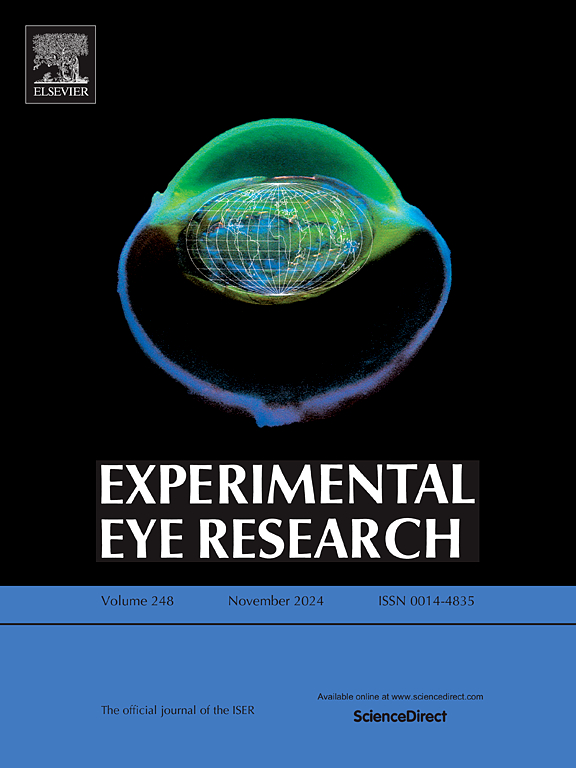内黏蛋白调节内皮细胞骨架与血管内皮生长因子无关。
IF 2.7
2区 医学
Q1 OPHTHALMOLOGY
引用次数: 0
摘要
内皮糖萼衬于内皮顶端表面,参与了一系列血管过程。糖萼由与膜结合的蛋白多糖和糖蛋白网络以及相关的血浆蛋白组成。内黏蛋白(EMCN)就是这样一种糖蛋白,我们的实验室发现它是 VEGFR2 功能的调节剂。将 siEMCN 注入 P5 小鼠眼内会损害血管发育。体外沉默 EMCN 可抑制血管内皮生长因子诱导的增殖和迁移。驱动细胞迁移的信号通路汇聚于细胞骨架重塑。通过共免疫沉淀与液相色谱/质谱联用,我们确定了 EMCN 与肌动蛋白细胞骨架组织相关蛋白之间的相互作用。该研究旨在探讨 EMCN 对血管生成过程中细胞骨架动力学的影响。消耗 EMCN 会导致 F-肌动蛋白水平下降,而过表达 EMCN 则会诱导富含应力纤维的细胞膜突起增加。肌动蛋白丝的重组并不依赖于 VEGFR2 信号,这表明 EMCN 连接了细胞骨架和糖萼。本文章由计算机程序翻译,如有差异,请以英文原文为准。
Endomucin regulates the endothelial cytoskeleton independently of VEGF
The endothelial glycocalyx, lining the apical surface of the endothelium, is involved in a host of vascular processes. The glycocalyx is comprised of a network of membrane-bound proteoglycans and glycoproteins along with associated plasma proteins. One such glycoprotein is endomucin (EMCN), which our lab has revealed is a modulator of VEGFR2 function. Intravitreal injection of siEMCN into the eyes of P5 mice impairs vascular development. In vitro silencing of EMCN suppresses VEGF-induced proliferation and migration. Signaling pathways that drive cell migration converge on cytoskeletal remodeling. By coupling co-immunoprecipitation with liquid chromatography/mass spectrometry, we identified interactions between EMCN and proteins associated with actin cytoskeleton organization. The aim of the study was to investigate the influence of EMCN on cytoskeleton dynamics in angiogenesis. EMCN depletion resulted in reduction of F-actin levels, whereas overexpression of EMCN induced increased membrane protrusions in cells that were rich in stress fibers. The reorganization of the actin filaments did not depend on VEGFR2 signaling, suggesting that EMCN connects the cytoskeleton and the glycocalyx.
求助全文
通过发布文献求助,成功后即可免费获取论文全文。
去求助
来源期刊

Experimental eye research
医学-眼科学
CiteScore
6.80
自引率
5.90%
发文量
323
审稿时长
66 days
期刊介绍:
The primary goal of Experimental Eye Research is to publish original research papers on all aspects of experimental biology of the eye and ocular tissues that seek to define the mechanisms of normal function and/or disease. Studies of ocular tissues that encompass the disciplines of cell biology, developmental biology, genetics, molecular biology, physiology, biochemistry, biophysics, immunology or microbiology are most welcomed. Manuscripts that are purely clinical or in a surgical area of ophthalmology are not appropriate for submission to Experimental Eye Research and if received will be returned without review.
 求助内容:
求助内容: 应助结果提醒方式:
应助结果提醒方式:


